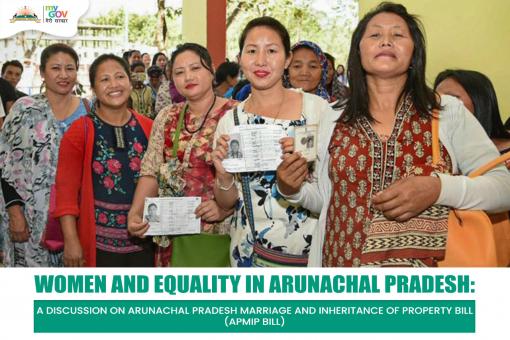A Discussion on Arunachal Pradesh Marriage and Inheritance of Property Bill (APMIP Bill)
Littles boys and girls in the indigenous households of Arunachal Pradesh are brought up with utmost care to turn into responsible citizens of the nation. However, when it comes to ancestral properties, sons have been favoured as entitled heirs as per age old traditions, for the continuation of family lineage. Despite having autonomy in domestic affairs, women did not have the right to inherit their parents’ or spouses’ properties customarily. The exception being that, if parents pass on their movable property to their daughters, they gain total rights and in some instances (such as an only girl child to a parent), women get to inherit the properties in the form of land and other assets.
In light of this, the Arunachal Pradesh State Women Commission (APSWC) drafted the Arunachal Pradesh Marriage and Inheritance of Property Bill (APMIP Bill), 2021 in collaboration with the Arunachal Pradesh State for Protection of Child Rights (APSPRCR) and the Arunachal Pradesh Women's Welfare Society (APWWS).
The bill intends to address the wider general issues about socio-economic situations and women's rights. The bill calls for regulating divorce, alimony payments, and marriage registration. Additionally, it has advocated for the criminalization of polygamy and the protection of widows and legally wed wives' property rights. In addition, the bill's Section 43 promotes granting Arunachal Pradesh Scheduled Tribe (APST) women who marry non-APST males the right to possess real estate. The bill states that: “An APST woman married to a non-APST man shall enjoy the legal right over any immovable properties acquired or inherited from her family in her lifetime. In the event of her death, the spouse and her heirs would have full rights over it for disposal and alienation to any indigenous APST tribal”.
If one views the state's centuries-old distinctive culture through a prismatic lens, men in Arunachal Pradesh society exercise ultimate authority in domestic matters. However, if viewed from a pragmatic angle, Arunachalee women contribute significantly to the economic, political, and sociocultural activities of their significant community, making it a much-needed women-centric tribal society.
Mygov-Arunachal calls for a discussion on the Arunachal Pradesh Marriage and Inheritance of Property Bill (APMIP Bill), 2021 and invites you to share your valuable insight and opinion on the equality of women in the state of Arunachal Pradesh and what steps we can further carry out to make our society equal and liberal in all aspects.

BrahmDevYadav 3 years 3 months ago
Who can take steps to bring equality?
Both constitution and society can take steps to bring gender equality.
BrahmDevYadav 3 years 3 months ago
What are the government programs for equality?
Some of these are flagship programmes like Mahatma Gandhi National Rural Employment Guarantee Scheme, Integrated Child Development Scheme, Sarva Siksha Abhiyanand National Rural Health Mission. It improves the social status of women in India.
BrahmDevYadav 3 years 3 months ago
What can the government do to stop inequality?
Redistribution. Redistributive policies can curb labor income inequalities. Direct taxes and transfers jointly reduce income inequality by more than one-third in advanced economies. However, in emerging market economies the extent of redistribution is much smaller.
BrahmDevYadav 3 years 3 months ago
What is the role of government in equality?
Any Government has a role to play in fostering equality in-general through certain policies. Such policies have overt and indirect effects on the social standing of both men and women. The chances of losing equality rise if such effects are not expected.
BrahmDevYadav 3 years 3 months ago
What are the steps taken by the government to reduce gender inequality?
In order to improve employability a separate Ministry of Skill Development and Entrepreneurship has been created. Equal Remuneration Act, 1973 provides for payment of equal remuneration to men and women workers for the same work of similar nature without any discrimination.
BrahmDevYadav 3 years 3 months ago
What is womens safety?
Women's safety involves strategies, practices and policies which aim to reduce gender based violence or violence against women including women's fear of crime. Women's safety involves safe spaces.
BrahmDevYadav 3 years 3 months ago
How can we improve female education?
Various measures have been suggested by the 'National Committee on Women's Education' for the improvement of girls' education and providing school facilities, opening of new schools, bringing schools within easy reach of the children, starting girls' section in boys' schools, condensed course for adult women etc.
BrahmDevYadav 3 years 3 months ago
Why is education important for women's rights?
Education is the foundation for civic participation and schools are formative in shaping how children and young people view themselves and others. Accordingly, it is essential that school environments foster gender equality and provide safe spaces in which all students can learn.
BrahmDevYadav 3 years 3 months ago
Why is women's learning important?
Both individuals and countries benefit from girls' education. Better educated women tend to be more informed about nutrition and healthcare, have fewer children, marry at a later age and their children are usually healthier, should they choose to become mothers.
BrahmDevYadav 3 years 3 months ago
What are the women's rights?
These factors include the right to live free from violence and discrimination; to enjoy the highest attainable standard of physical and mental health; to be educated, to own property, to vote and to earn an equal wage. But across the globe many women and girls still face discrimination on the basis of sex and gender.